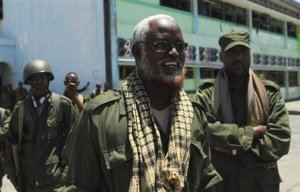
Somalia's Sheikh Ahmed Madobe is seen at the main seaport of Somalia's port city of Kismayu, October …
ADDIS ABABA (Reuters) - Somalia's central government agreed on Wednesday to recognise a former Islamist commander as the interim leader of the southern Juba region, a deal that could help end months of clan fighting and cement plans for a federal nation.
Diplomats said the pact signed in Ethiopia's capital, after days of talks and delays, was a significant step towards stabilising Somalia as it seeks to create devolved government, and could become a blueprint for sharing power in other areas.
An official from Mogadishu's government signed the deal with Sheikh Ahmed Madobe, who has been vying for control of Jubaland's port city of Kismayu and its hinterland against a clan warlord widely seen as backed by Mogadishu.
"We are hopeful that this process will be a starting point for Somalia to be a federal state," Madobe said at the signing, through a translator. "There will be people who won't be happy, but the fundamental issue is the interest of the Somali people."
At the heart of the tussle over Kismayu has been control of the area's economic resources, in particular its lucrative port.
The fate of Somalia's second biggest city has been seen as a litmus test for the future of the Horn of Africa nation as it rebuilds from the ruins of war and anchors a wobbly peace.
That quest has been hampered by the central government's weakness outside the capital and its troubled relations with provinces seeking more autonomy than it has been ready to cede.
"This is really a breakthrough in a problem that has dogged the country for at least a year now," said Nick Kay, the U.N. special representative for Somalia, who was in Addis Ababa.
"It opens the door now for political progress across the whole of Somalia," he said.
Under the terms of Wednesday's deal, Madobe will be leader of the interim Juba Administration for a period of two years.
The authority under his control will manage the port for six months after which control will shift to the federal government, although revenues will pay for services in Jubaland.
LONG JOURNEY
The deal will be a relief to Somalia's neighbours and the West which fear any renewed fighting could strengthen al Shabaab Islamist rebels, who have been pushed out of major urban areas but still threaten stability in East Africa and beyond.
Somali politicians in other breakaway or more autonomous regions have continued to voice scepticism about the central government's commitment to a federation, accusing Mogadishu of trying to hog power. The government says it is ready to share.
"This deal is the beginning of a long journey for peace building, reconciliation, and for building a viable permanent administrations in these regions," Farah Sheikh Abdulkadir, Somalia's State Minister for the Presidency, told Reuters.
Madobe is a former governor of Kismayu and one-time Islamist commander under an administration crushed by Ethiopian forces sent into Somalia between 2006 and 2009 with tacit U.S. backing.
He was held in Ethiopia for two years. After his release, Madobe and his powerful Ras Kamboni militia sided with Kenyan troops against al Shabaab from late 2011, flushing the rebels out of their strongholds in the south of the country.
"The mere fact, given the nature of politics and the constituencies in Somalia, that the two sides should have decided to override factionalism and find a deal is for me absolutely fundamental," Alexander Rondos, the European Union's special representative to the Horn of Africa, said by telephone.
Riding on a wave of international support after his election in September last year, some analysts say President Hassan Sheikh Mohamud has appeared reluctant to decentralise power.
Diplomats say Mohamud has lost political capital internally over his handling of Kismayu and another region, Puntland, which broke off ties with Mogadishu this month, accusing the government of failing to respect the federal structure.
Mogadishu's Abdulkadir said building such a structure needed time. "Federation requires a legal framework that is not existing and we did not inherit one. It also needs institutional capacity that is not available," he said.

No comments:
Post a Comment